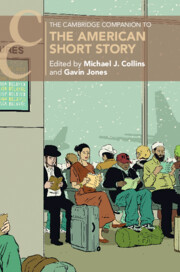Book contents
- The Cambridge Companion to the American Short Story
- The Cambridge Companion to the American Short Story
- Copyright page
- Contents
- Figures
- Tables
- Contributors
- Chronology
- Introduction
- Part I Contexts
- Part II Histories
- Part III People and Places
- Part IV Theories
- Chapter 17 Short Fiction, Language Learning, and Innocent Comedy
- Chapter 18 The Technology of the Short Story
- Chapter 19 Homelessness
- Chapter 20 The Human and the Animal
- Chapter 21 The End of the Story
- Chapter 22 The Affordances of Mere Length
- Notes
- Further Reading
- Index
- Cambridge Companions to…
- References
Chapter 20 - The Human and the Animal
Toward Posthumanist Short Fiction
from Part IV - Theories
Published online by Cambridge University Press: 11 May 2023
- The Cambridge Companion to the American Short Story
- The Cambridge Companion to the American Short Story
- Copyright page
- Contents
- Figures
- Tables
- Contributors
- Chronology
- Introduction
- Part I Contexts
- Part II Histories
- Part III People and Places
- Part IV Theories
- Chapter 17 Short Fiction, Language Learning, and Innocent Comedy
- Chapter 18 The Technology of the Short Story
- Chapter 19 Homelessness
- Chapter 20 The Human and the Animal
- Chapter 21 The End of the Story
- Chapter 22 The Affordances of Mere Length
- Notes
- Further Reading
- Index
- Cambridge Companions to…
- References
Summary
This chapter tracks the figure of the rat across American short fiction, focusing in particular on H. P. Lovecraft’s “The Rats in the Walls” (1924), Ursula K. Le Guin’s “Mazes” (1975), and Karen Joy Fowler’s “Us” (2013). These stories illustrate powerful narrative effects that can be produced by constructing particular forms of animality, while also blurring, at times, the boundaries between what it means to be a human and what it means to be an animal. The chapter engages with the academic fields of human–animal studies, multispecies studies, and animality studies, exploring the short stories not only in relation to animal advocacy, but also problematic histories of animalizing certain human groups. Posthumanism cuts across these various fields, questioning constructions of the human as fundamentally different and superior to all other species on the planet. The chapter ultimately argues that some narrative techniques have more posthumanist potential than others.
Keywords
- Type
- Chapter
- Information
- The Cambridge Companion to the American Short Story , pp. 313 - 326Publisher: Cambridge University PressPrint publication year: 2023



